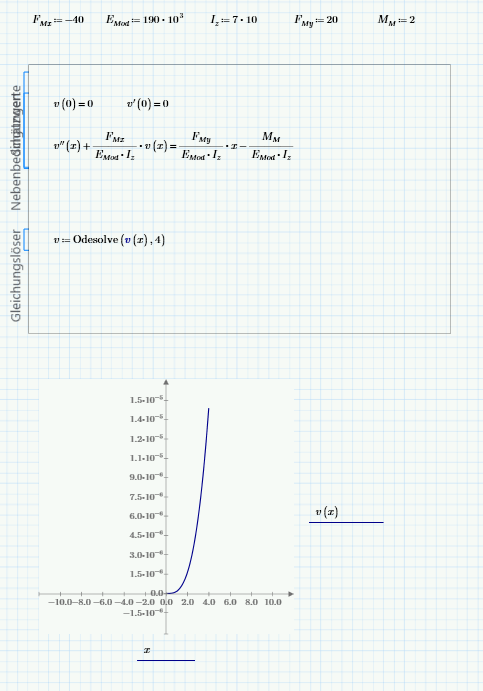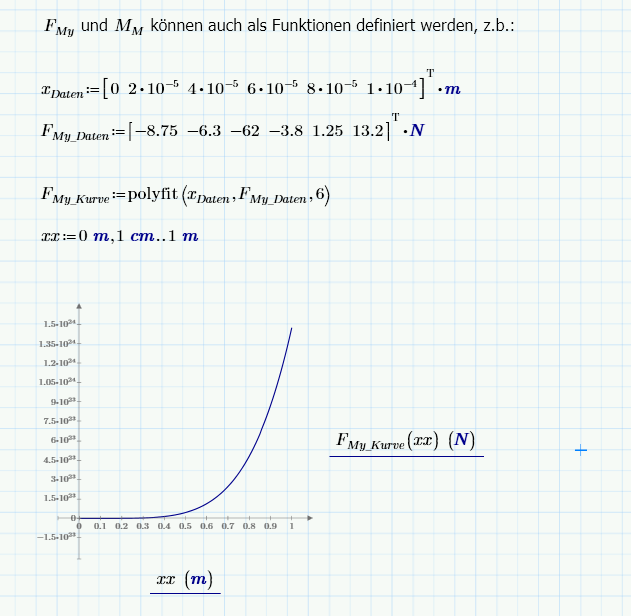Community Tip - Want the oppurtunity to discuss enhancements to PTC products? Join a working group! X
- Subscribe to RSS Feed
- Mark Topic as New
- Mark Topic as Read
- Float this Topic for Current User
- Bookmark
- Subscribe
- Mute
- Printer Friendly Page
Find Forces by solving 2nd order ODE with boundery conditions
- Mark as New
- Bookmark
- Subscribe
- Mute
- Subscribe to RSS Feed
- Permalink
- Notify Moderator
Find Forces by solving 2nd order ODE with boundery conditions
Hi guys
I am pretty new to Mathcad and hope somebody can help me. I need to know the forces and torques acting on a flat spring I have in my machine. In order to do so I have to solve the 2nd order differential equation and put in the boundary conditions shown below. FMy and MM are not known.
In order to solve the equation with odesolve() I have to give values for all constants and it can only solve the problem for two boundary conditions. This is not helpful since I don't know FMy and MM.
What would be a smart approach to solve this problem?
Regards, Daniel
Solved! Go to Solution.
- Labels:
-
Calculus_Derivatives
Accepted Solutions
- Mark as New
- Bookmark
- Subscribe
- Mute
- Subscribe to RSS Feed
- Permalink
- Notify Moderator
It looks like you have a spring with both ends built-in and you're forcing one end to shift and adding an axial load.

You can solve this problem without solving the ODE:
- Mark as New
- Bookmark
- Subscribe
- Mute
- Subscribe to RSS Feed
- Permalink
- Notify Moderator
Daniel,
please attach your worksheet
Regards, Volker
- Mark as New
- Bookmark
- Subscribe
- Mute
- Subscribe to RSS Feed
- Permalink
- Notify Moderator
Daniel;
Two things:
- Prime is capable of handling units, even in differential equations. So give your variables units to go with the values.
- Mathcad's solvers are set up more for initial value problems than boundary value problems. There should be help for dealing with the situation.
And, as Volker says, attaching your sheet will give us a better chance at solving the problems. (In the upper right corner is "Use Advanced Editor." When you click that, The word "Attach" will appear in the lower right corner, and you can attach files to your entry.)
- Mark as New
- Bookmark
- Subscribe
- Mute
- Subscribe to RSS Feed
- Permalink
- Notify Moderator
First of all, you have to use Odesolve in a solve block.
Then we need initial conditions for solving the differentiel equation.
And we need the constants Fmy and Mmy.
What do you intend to calculate- i think it's a beam bending problem.
The values for E and I are looking strange.
you can work with units in a solve block
see attached sheet.

regards, Volker
- Mark as New
- Bookmark
- Subscribe
- Mute
- Subscribe to RSS Feed
- Permalink
- Notify Moderator
Thanks for the prompt response. See the worksheet attached. You are correct, we are talking about a bending problem. The units are not the issue.
You say Volker that we need Fmy and Mm. But those are exactly the variables I have to find with my boundary conditions. Once I know them I can calculate the stress in the spring which is what I really need at the end.
In the attached worksheet you can see that I searched for Fmy and Mm by hand. That is quite troublesome. There must be a better way.
BR, Daniel
- Mark as New
- Bookmark
- Subscribe
- Mute
- Subscribe to RSS Feed
- Permalink
- Notify Moderator
Daniel,
maybe it helps you, if we create a function for eg. Fmy- see attachement please.

i assume, that you made some measurements to get data for Fmy.
These data you can apply with the function "polyfit" i created in your worksheet to get Fmy in dependence to x for example, Fmy------>f(x).
viel Glück damit, Gruß Volker
- Mark as New
- Bookmark
- Subscribe
- Mute
- Subscribe to RSS Feed
- Permalink
- Notify Moderator
It looks like you have a spring with both ends built-in and you're forcing one end to shift and adding an axial load.

You can solve this problem without solving the ODE:
- Mark as New
- Bookmark
- Subscribe
- Mute
- Subscribe to RSS Feed
- Permalink
- Notify Moderator
Thanks for this solution. That is exactly what I needed.
- Mark as New
- Bookmark
- Subscribe
- Mute
- Subscribe to RSS Feed
- Permalink
- Notify Moderator
Now, make it work with units!





